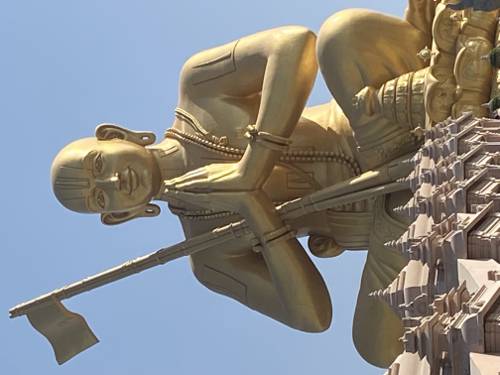
FAQ About Ramanuja

Who was Ramanuja?
Ramanuja was a prominent Hindu theologian and philosopher, born in 1017 CE in Tamil Nadu, India. He is best known for his philosophical school of Vishishtadvaita Vedanta, which emphasizes the unity of the individual soul and the supreme being, Brahman, with a distinct difference. Ramanuja's teachings influenced religious and philosophical thought in India significantly, and he played a crucial role in reviving and strengthening the Bhakti movement.

What is Vishishtadvaita Vedanta?
Vishishtadvaita Vedanta, a school of Vedanta philosophy, was proposed by Ramanuja. It literally means "qualified non-dualism" and posits that all diversity and plurality exist within the same reality, Brahman, but are inherently qualified or shaped by that reality. According to this philosophy, the universe and the souls are real but exist as a part of Brahman's body, thereby stressing both unity and diversity.

What are the main works of Ramanuja?
Ramanuja's key works include the Sri Bhashya, a detailed commentary on the Brahma Sutras, and the Gita Bhashya, which is an interpretation of the Bhagavad Gita. Other notable works are the Vedartha Sangraha and Vedanta Sara. These works collectively outline his theological perspectives and establish the basis for the Vishishtadvaita school of thought.

How did Ramanuja influence the Bhakti movement?
Ramanuja was instrumental in promoting the Bhakti movement, which emphasized personal devotion to God as a path to spiritual fulfillment. He preached that salvation could be achieved through Bhakti (devotion) rather than through ritualistic practices or ascetic renunciation. His philosophy and teachings revived interest in personal devotion and encouraged the congregation of worshippers into communities, further spreading the Bhakti movement across southern India.

Where did Ramanuja spend most of his life?
Ramanuja spent much of his life in the regions of Tamil Nadu and Karnataka in southern India. He was closely associated with the temple town of Srirangam in Tamil Nadu, where he served as a chief priest and organized the temple's administration. Srirangam became a significant center for the Vishishtadvaita school and continues to be a place of pilgrimage for Ramanuja's followers.

What was Ramanuja's view on the relationship between God and the soul?
According to Ramanuja's Vishishtadvaita philosophy, the soul (jiva) and God (Brahman) are distinct yet inherently connected. He taught that the soul is part of God's body, existing within God's essence but maintaining a distinct identity. This relationship is characterized by the soul's dependence on Brahman and the inherent unity despite distinct qualities, which is a central tenet of qualified non-dualism.

Did Ramanuja's teachings conflict with Advaita Vedanta?
Yes, Ramanuja's teachings of Vishishtadvaita Vedanta presented a significant philosophical departure from the Advaita Vedanta, which is based on non-dualism. Advaita Vedanta, advocated by Adi Shankaracharya, posits that the ultimate reality is a non-dual oneness (Brahman) and the phenomenal world is an illusion (maya). In contrast, Ramanuja argued for a reality where Brahman includes diversity and individual souls and the world are real, but dependently exist within Brahman.

What is the significance of 'Sri Bhashya'?
The Sri Bhashya is a principal work by Ramanuja, serving as his comprehensive commentary on the Brahma Sutras. It is significant because it elaborates on the Vishishtadvaita philosophy, systematically arguing against other interpretations while establishing the principles of qualified non-dualism. This work is a cornerstone of his thought on the relationship between the individual soul and God, aiming to offer a philosophical foundation for the theology of Bhakti.

Why is the temple town of Srirangam important to Ramanuja's legacy?
The temple town of Srirangam holds significant importance in Ramanuja's legacy due to its association with his life and work. Ramanuja organized and supervised the temple administration in Srirangam, initiating reforms to promote inclusivity and devotional practices. It became a major center for the propagation of his Vishishtadvaita philosophy. Today, Ramanuja's physical form, wrapped in a specially treated cloak, is preserved and venerated in the Srirangam Temple, making it a crucial pilgrimage site for his followers.

How did Ramanuja's philosophy differ from other Vedantic schools?
Ramanuja's Vishishtadvaita Vedanta differs from other Vedantic schools primarily through its unique reconciliation of unity and diversity in Brahman. Unlike Advaita Vedanta, which asserts a monistic view that denies any ultimate diversity (with the phenomena world considered as maya), Vishishtadvaita acknowledges both the reality of individual souls and the universe, describing them as attributes of the same singular Brahman. This school incorporates devotion and personal relationship with Brahman, which is distinct from dualistic and monistic interpretations.

What role did Ramanuja play in temple worship reforms?
Ramanuja played a pivotal role in reforming temple worship practices to be more inclusive and accessible. He encouraged the use of vernacular languages, like Tamil, in worship to make religious devotions accessible to the common man, who may not have known Sanskrit. Ramanuja's reforms also included organizational changes to temple administration and liturgies, placing a greater emphasis on community involvement and collective worship, elements that embodied the Bhakti spirit.

Is Ramanuja venerated today, and by whom?
Yes, Ramanuja is venerated today, particularly among followers of the Sri Vaishnava tradition. His teachings and reforms have had a lasting impact on Vaishnavism, and he is considered one of the three chief preceptors in this tradition. Pilgrims visit places like Srirangam to pay respects and seek blessings, and his philosophical contributions continue to be studied and revered within wider Hindu scholarship.

What are Ramanuja's contributions to Indian philosophy?
Ramanuja's contributions to Indian philosophy are significant, marked by his development of the Vishishtadvaita Vedanta school. He introduced important theological debates around the nature of Brahman, individual souls, and the universe, providing a comprehensive framework to discuss spirituality and devotion. His emphasis on Bhakti as a path to salvation broadened religious practices and influenced other philosophical schools and religious movements, offering a meaningful fusion of devotional and philosophical elements.

How does Vishishtadvaita interpret the Upanishads?
In the Vishishtadvaita interpretation, the Upanishads are seen as affirming the oneness of the universe with Brahman while simultaneously accepting the reality of multiplicity. This school interprets the Upanishads as conveying a synthesis of unity and differentiation, where Brahman is qualified by attributes and relationships, specifically emphasizing a devotional and intimate relationship with the divine as an integral part of spiritual knowledge and liberation.

What influence did Ramanuja have on later Hindu thought?
Ramanuja influenced later Hindu thought by laying the philosophical groundwork for emphasizing personal devotion and the religious community's role. His ideas provided a structure for understanding worldly diversity and divine unity, impacting not only subsequent Vedanta interpreters but also the broader Bhakti movements across India, which focused on the personal experience of the divine, predicated on his reconciliation of philosophical rigor with devotional theology.

How do scholars view Ramanuja's relationship with other philosophical traditions?
Scholars view Ramanuja's relationship with other philosophical traditions as one of critical engagement and reinterpretation. He critically assessed the propositions of Advaita and other Vedantic schools and offered alternative views through his Vishishtadvaita, promoting a vibrant discourse on the nature of reality, God, and the soul. His dialogues address intersections and differences with Buddhist philosophies as well, showcasing his comprehensive approach to synthesizing and challenging contemporary thought.

Did Ramanuja establish any religious community or order?
Yes, Ramanuja is credited with organizing and establishing a religious order based around the Sri Vaishnavism philosophy. This community follows his teachings closely, centered on devotional practices and scriptural interpretations that align with Vishishtadvaita principles. His efforts in organizing temple worship and community structures significantly strengthened this religious group, ensuring its enduring presence and influence in Hinduism.

What challenges did Ramanuja face during his lifetime?
Ramanuja faced several challenges, including opposition from established religious authorities who were resistant to his reforms and teachings. His inclusive approach to worship and the use of vernacular languages deviated from the normative Sanskrit-centric practices, leading to conflicts with more conservative elements. Additionally, some rulers and political climates were initially hostile, causing him to spend periods in exile, though he ultimately managed to gain wider acceptance and influence.

What are the key teachings of Ramanuja's philosophy?
Key teachings of Ramanuja's philosophy include the affirmation that the universe, souls, and Brahman are real, with Brahman possessing qualities that embrace both diversity and unity. His philosophy underscores devotion (Bhakti) as a primary means to attain liberation, advocating a personal relationship with the divine. Ramanuja emphasized the importance of community and collective worship as well as inclusivity in religious practices, allowing broader access to spiritual growth.

How did Ramanuja's thought influence other religions or philosophies?
Ramanuja's thought influenced other religions and philosophies by providing a robust framework for discussing the interrelationships between the divine, metaphysics, and devotional practices. His emphasis on Bhakti laid groundwork for overlapping interpretations found in later traditions, including aspects of Sikhism and contemporary Hindu movements. His synthesis of dualistic and non-dualistic ideas spurred dialogues and adaptations within Indian and global spiritual discourses.
